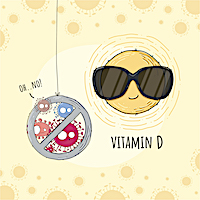Vitamin D deficiency impedes good immune function and has been shown to contribute to the seasonal increase of viral respiratory infections, possibly including COVID-19. A combination of factors makes it likely that individuals are deficient in vitamin D: old age, obesity, dark skin tone, and common genetic variants. The risk is even greater for those living in high latitudes, where vitamin D deficiency is extremely common in winter and spring because of low levels of sunlight, according to a new review article by Martin Kohlmeier, MD, PhD, published in BMJ Nutrition, Prevention & Health. Kohlmeier is director of the Human Research Core and Nutrigenetics Laboratory at the UNC Nutrition Research Institute, and professor of Nutrition at the School of Medicine and Gillings School of Global Public Health, University of North Carolina at Chapel Hill.
Most people get no more than very modest amounts of vitamin D from dietary intake. By far, the most vitamin D in blood comes from skin exposed to sunlight, specifically UVB rays, and, the capacity to make vitamin D in skin is limited by skin pigmentation. An analysis of deaths of African Americans considered attributable to COVID-19 in the US shows a greater disparity in northern than in southern states. It is conceivable that vitamin D adequacy in locations where sunlight is stronger denies the virus easy footholds and thereby slows spreading of the contagion. This finding should drive home the message that vitamin D supplementation is particularly important for African Americans and others with a dark skin tone.
“Rigorously remedying vitamin D deficiency, even for a few months during these seasons, would help reverse known health impacts that include decreased life expectancy and increased mortality. Slowing the spread of COVID-19 would be an important bonus,” said Kohlmeier,
In the context of the current Covid-19 pandemic renewed attention to the very high prevalence of severe vitamin D deficiency is in order. Advanced age, obesity, darker skin tone and risk-related genotypes, particularly in combination, are alarm signs that should prompt corrective action, typically with a moderate, individually tailored dose of supplemental vitamin D. While the preventive potential of supplemental vitamin D should not be exaggerated and the dose kept within recommended ranges, preventing vitamin D deficiency should be a widely shared goal.
For additional information about vitamin D and COVID-19 see:

